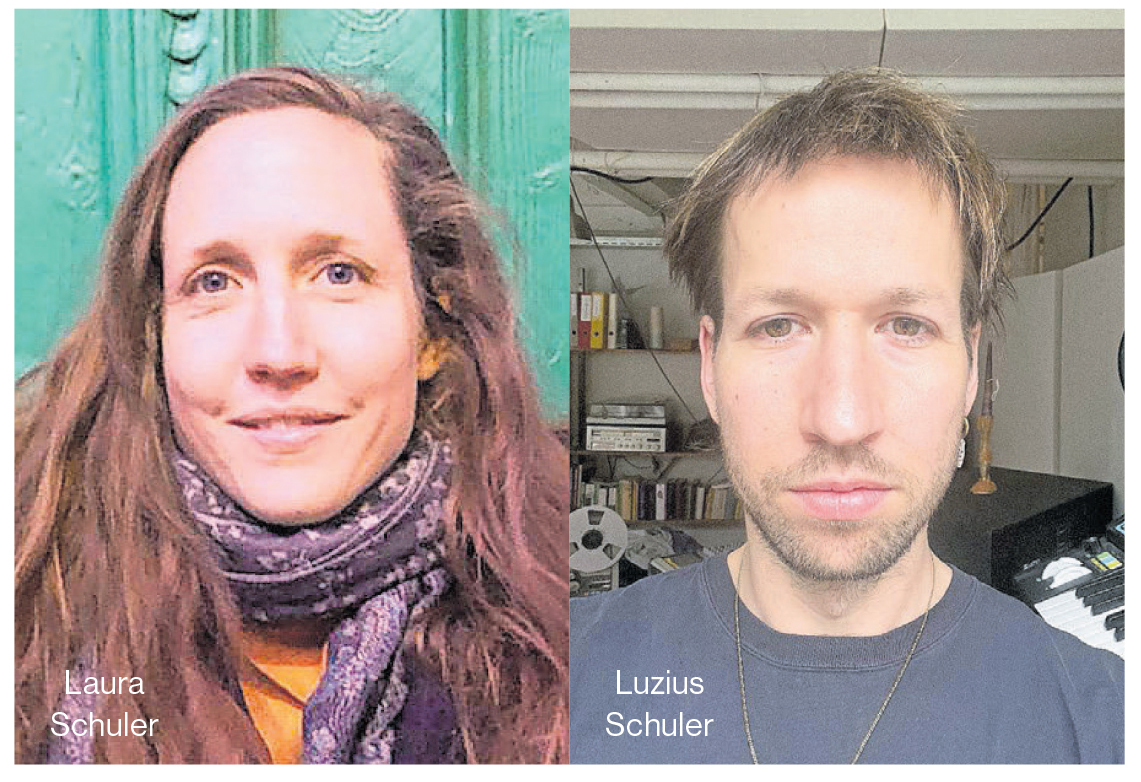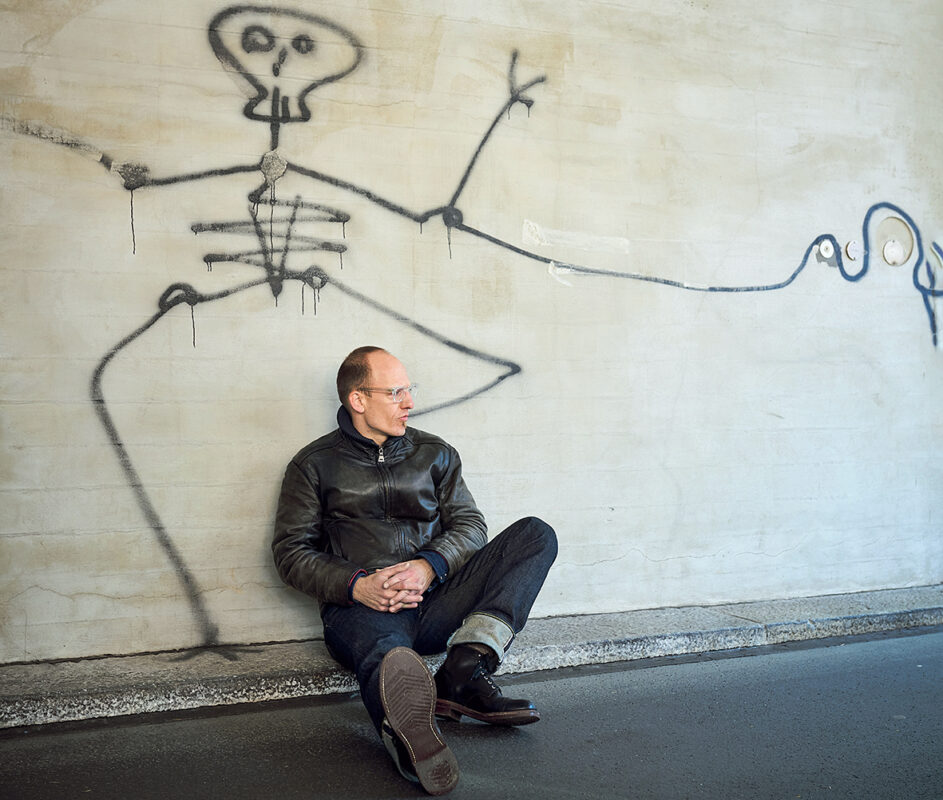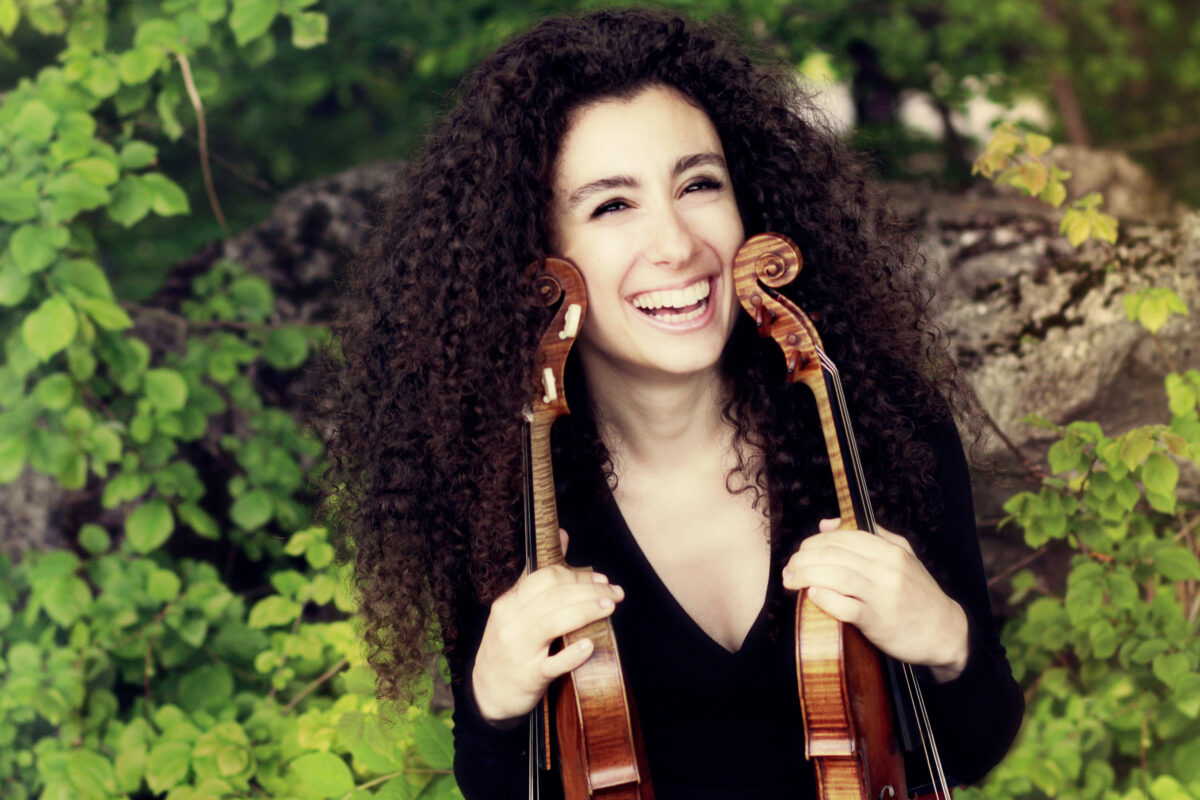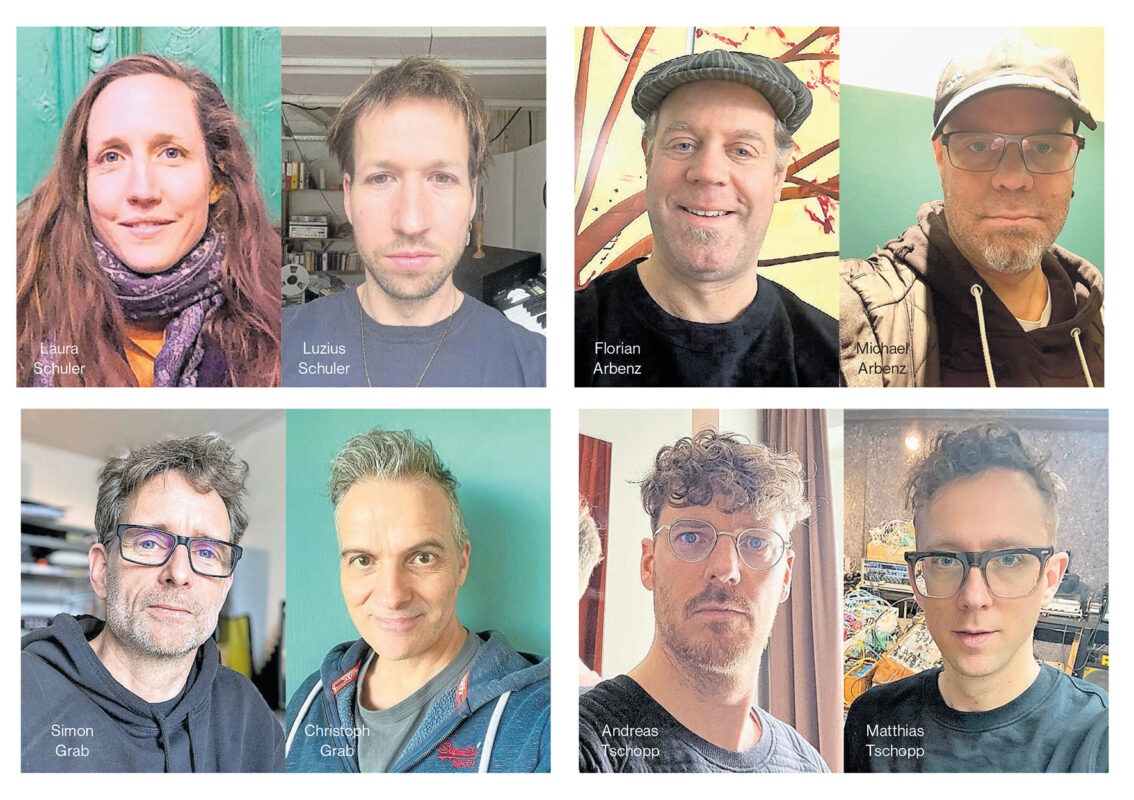Laura & Luzius Schuler
Laura, 1987, violin
Luzius, 1989, piano

Hanspeter Künzler: You have a concert together soon. At the beginning of March. The start of a new project?
LUZIUS The concert is in Poschiavo, Puschlav, in a church. Laura has been there a lot recently and we thought it would be exciting to do something with organ and violin in a church. It was a good idea. The church is hardly used and it turned out to be mega exciting to work there. We met there twice for a few days and discovered something new for us by improvising. Playing in such a huge space with such a huge instrument, the organ, is exciting.
We started a process, we thought a lot about the fact that we didn't want to compose because it would take something away from the directness of interacting together and that we would also get directly involved or intervene in the sound. Then we started practicing improvisations, so to speak, and that turned into a kind of piece. Now it's time to record them. That will happen during this week in March, when we will also play a concert. It's a collaboration between the two of us, which we're doing for the first time. We had a band with a bass player for a relatively long time, but that's fallen asleep a bit now.
LAURA We never said we would stop. There were simply other priorities.
Making music as siblings - is that somehow different from making music with other people you've been in a band with for maybe 2 or 3 years?
LAURA The way I experienced it - it's probably different for all siblings - I would say it was almost a bit of a hindrance at the beginning. Of course we were very familiar with each other, but there were a lot of sibling dynamics that can sometimes be a hindrance. But in the good moments, it can be really great. At the moment, we actually only have good moments. We've grown older, shed our horns and been able to leave certain ego things behind us.
LUZIUS I see it in a similar way. We both have so many projects behind us, bands have come and gone, we've gained a lot of experience, we've realized that there are interpersonal components that can be applied to being siblings. That's where I realized that it's worth addressing things. If you realize that there is something in the room that is preventing us from making music freely, it is important to address it. Or that you create an environment where the interpersonal aspects affect the music. Then I have the feeling that close personal relationships can have a very stimulating and positive effect on the creative process.
LAURA I also think it's the component with us, we just grew up with the same music for many years...
And that was?
LAURA Roughly speaking, early baroque renaissance music and Eastern European folk music.
The parents played that? And the father also built the instruments, if I've read correctly.
LAURA Exactly. So we have a common ground when we improvise. We are certainly also trying to emancipate ourselves. As Luzi said, we want to develop a new music for this new project. Perhaps there is also a danger of falling into clichés if you have too much common ground. But it's definitely a good foundation.
How old were you when you played together for the first time?
LAURA As a child, from the very beginning.
When did you start playing the violin?
LAURA I was seven.
And you, Luzius?
LUZIUS Probably the same age. Seven or eight, something like that. Piano. As children, we might have made music from time to time. But then I think there was a rather difficult time. I started my professional studies, and you're extremely preoccupied with yourself. For me, I had my own struggle between ambition and the feeling of not being good enough. That took a relatively long time. That's how you do your studies, then your first professional experiences.
It then took a relatively long time before I was able to get involved in making music with Laura in a family context. I have the feeling that it was the first time with the band Esche that we were really able to meet as musical individuals and personalities. Before that, it didn't happen because Laura had been abroad for a relatively long time, was doing her Master's degree and was connected to the scene. And I had my own things. It was a relatively long arc up to this point.
With the Esche trio, was bassist Lisa Hoppe something like a referee or a bridge between you?
LAURA Hmmm. In certain situations yes, sometimes it was Luzi, sometimes it was me. We had a relatively balanced three-way dynamic. We always said: There's the sibling front, the female front and the rhythm section front. That could change quite dynamically. And, yes, when I think of Esche, what Luzius and I are doing now, taking the time to develop the music together, also compositionally, that's something I would always have wished for Esche.
The immersion. That's actually what I wish for all bands today, but it's just not always realistic. It's great when you have time and not everyone in the room comes up with something. For me, something like that never has the same musical power as something developed as a collective. The fact that I let go of the band a bit, Esche, probably had something to do with the fact that it wasn't as fulfilling musically - unless we improvised. Improvising always worked well.
In your compositions, as I think I can gather from the various Bandcamp texts, improvisation occupies an important position. I assume that this is precisely the reason for this: that you have space to come together.
LAURA Exactly. That's very much the case with my quartet.
I read in an interview with you that you got tired of the violin at 15 and then discovered other things in the youth club, not least improvisation.
LAURA That's the case. We formed a band, started with Eastern European folk music and then also made our own songs. After that, I had a phase where I traveled a lot. I bought a guitar and went to South America, played the djembe and wrote Spanish lyrics. I think if I hadn't started studying jazz back then, I wouldn't have ended up where I am now.
Did you have any role models on the jazz violin?
LAURA I took my studies very seriously. I actually only really started listening to jazz during my studies. I put it very much above myself. Today I really like listening to Coltrane or something like that, I can still totally feel the energy, but it's not what defines me. But that's another discussion, the pros and cons of studying music. I would say that if my studies had been broader, I could have spared myself a few detours. But maybe that's not true at all. Now I'm just where I am.
Luzius, did you go through a similar phase with the piano, a kind of punk phase?
LUZIUS Probably less. Although I did go through a phase where I immersed myself in the alternative youth culture in Langenthal, between 15 and 19. I followed Laura there. But the piano has actually always been a companion for me. In high school, I changed teachers and came to someone who was studying jazz piano in Bern at the time. I have really formative memories of that, he played the treasures of jazz piano for me in an attic room, the harmonies. I learned something new every week.
I must have been a really pleasant student, because I actually practiced. I was motivated. But I wasn't thinking about doing it professionally. Until after my A-levels, I had the feeling I was studying biology or chemistry or something. One day, the teacher said: there's a window open right now for vocational studies in Bern, so I just applied and, to my astonishment, got a place straight away. But then it took me at least a bachelor's degree to get an idea of what it could be like to be a musician who develops throughout his life. Looking back, I could never have imagined being where I am now. Nevertheless, the idea of working on a solo vision only came to me two or three years ago.
When you were 20, did you two talk about your musical discoveries?
LAURA We were like at a different point. I didn't go from high school to university the way Luzi did. I first did an apprenticeship as a nurse in an old people's home. Afterwards, I had to emancipate myself quite a bit to go to university. First I did a two-year preliminary course. I was already playing in bands at the time, lots of gigs. There was a lot going on for me outside of school, but not jazz. I almost had to force myself to study, and that worked because I'm very hard-working, disciplined and put things above myself. As a result, I think there was a bit of a gap between Luzi and me.
It seemed to me that everything was always so easy for Luzi and I was really struggling. Maybe it also had something to do with the fact that I'm a woman and Luzi is a man and all the gender-based differences, and then there's the violin and all the stupid comments from the teachers. That's why it was always clear to me that if I did a Master's degree, I would go abroad. So I went to Scandinavia for two years. That was great. Above all, I improvised freely there. But that was also when I started Esche. I have the feeling that the musical exchange between the two of us only began then. Before that, we had different realities.
What was the constellation that led to the founding of Esche?
LAURA It all started when I was awarded a Friedl Wald scholarship. Every year, a few students are selected who are in their final year of their bachelor's degree. They can audition and receive 15,000 francs. I was nominated, needed a band for the audition and asked Luzi and Lisa. I didn't think much about it - I just needed good musicians.
LUZIUS I was still inexperienced myself in how to approach something like that. Playing together for the first time. The following years with the band were exciting. At the time, it was the only working band for me where you had such a creative exchange over a longer period of time, where everyone got involved. It was a lot about finding compromises and balancing our needs in terms of our musical ideas. In retrospect, I found it a very enriching process because I was confronted with other ways of thinking about music.
But there was also a lot of energy loss due to the rubbing. Finding consensus is sometimes not easy. It was always part of the band that it was slightly gnarly, but that you shared a lot of beautiful moments. We traveled a lot, absolute DIY tours, Germany several times, Scandinavia, random places. I learned a lot from doing things like that together, holding my own. Especially when not so many people come, or when people are suspicious of us. With Esche, I was able to satisfy an experimental need that I wasn't able to do in the other projects.
So Esche was not just a musical experiment, so to speak, but also an experiment in communication? And because you knew each other so well from growing up, it was both easier and more difficult at the same time ...
LAURA Exactly. It was very intense emotionally. Sometimes there were tears. But also euphoria. I have to say, I learned a lot about communication from Lisa. She noticed ingrained family mechanisms. For example, she always said I would interrupt her, which I think I did less and less. Sometimes things you're not so aware of ...
How much time lies between Esche and these duo concerts?
LAURA The last Esche concert was in May 2021 at the Schaffhausen Jazz Festival ...
What you both do is incredibly wide-ranging. Don't you sometimes get a bit lost? Don't you know where your head is anymore?
LUZIUS I think I have my drawers. I realize when I create music, for example now with Laura, that you invest a lot of time in the beginning to create a framework. Lots of discussions about how and what the music could be. This project, for example, I associate very strongly with the place Poschiavo, with something archaic, with the mountain world. I see textures with which I associate the sound of the organ or the mountain world and create something like an emotional framework there. Then I can decide relatively well what fits in there and what doesn't. At the moment I'm involved in several productions that are running in parallel. You can't avoid finding an abstract intermediate stage.
LAURA I feel the same way. We also have different projects. They all have their own clear language, visually, artistically and musically. What I really like about the duo now is that we improvised at the beginning, recorded a lot, started a lot, discussed what we liked and what we didn't like. And we actually always agreed on where we wanted to go. The project came about very organically. It has to be like that. Not something thought up in the style of "I could actually do this after all". That's why it has the power, the expression.
A question for Laura. I found a quote from you in the Bund: "I'd like to be unreasonable, but I'm just not." Isn't music a means of overriding reason?
LAURA I didn't necessarily mean reason there. It was more about being good, wanting to be as good as possible. Not staying in bed in the morning, hanging around in your pyjamas until 12 o'clock, drinking coffee until 2 o'clock and reading the newspaper at 3 o'clock. The interview was two years ago. I have the feeling that I'm pretty good at that now too.








